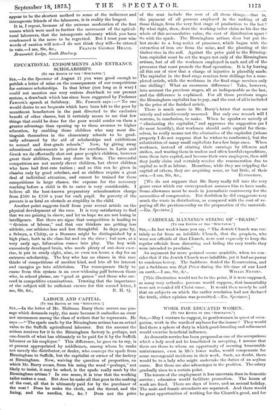LABOUR AND CAPITAL.
(TO THE EDITOR OF THE "SPECTATOR.") Si,—In the letter of Mr. Maltrnan Barry there occurs one pas- sage which demands reply, the more because it embodies an error not uncommon among the class of writers that he represents. He says :—" The spade made by the Birmingham artisan has an actual value to the Suffolk agricultural labourer. But the amount the artisan receives for it in the Birmingham factory is, perhaps, not one-fourth of what has ultimately to be paid for it by the Suffolk labourer or his employer." This difference, he goes on to say, is at present appropriated by middlemen, among whom he ranks not merely the distributor, or dealer, who conveys the spade from Birmingham to Suffolk, but the capitalist or owner of the factory at Birmingham. Now, waiving the question of proportion, on which Mr. Barry seems, from his using the word "perhaps," not likely to insist, it may be asked, is the spade really made by the Birmingham artisan ? In one sense, it is true that the working tailor makes a coat. But does he make all that goes to the making of the coat, all that is ultimately paid for by the purchaser of the coat ? Does he make the cloth, and the thread, and the lining, and the needles, &c., &e. ? Does not the price
of the coat include the cost of all those things,—that is, the payment of all persons employed in the making of all those things, from the very first stage of production to the last? By what right, then, does the working tailor claim as his due the whole of this accumulative value, the cost of distribution apart? So with the spade. The Birmingham artisan does but put the last stroke to a long series of processes, which began with the extraction of iron ore from the mine, and the planting of the timber-tree in the soil. Against the price paid to the Birming- ham capitalist must be set the wages not only of the Birmingham artisan, but of all the workmen employed in each and all of the processes that must precede the final operation. It is by leaving all this out of view that a charge of injustice is plausibly made. The capitalist in the final stage receives four shillings for a com- pleted article, while the workman in the final stage receives only one shilling ! What an enormous difference ! Take, however, into account the previous stages, all as indispensable as the last, and the difference is explained. For all those previous stages the Birmingham capitalist has to pay, and the cost of all is included in the price of the finished article.
There is much more in Mr. Barry's letter that seems to me utterly and mischievously unsound. But only one remark will I venture, in conclusion, to make. When he speaks so naively of "eliminating the capitalist," and approves the suggestion (as I do most heartily), that workmen should nicks capital for them- selves, he really means not the elimination of the capitalist (whose property I do not suppose that he wishes to confiscate), but the substitution of many small capitalists for a few large ones. When workmen, instead of stinting their earnings by idleness and strikes, and wasting them in useless and often hurtful expenditure, turn them into capital, and become their own employers, then will they justly claim and certainly receive the remuneration due to capital as well as labour. Meantime, while they are crippling the capital of others, they are acquiring none, or but little, of their [We do not suppose that Mr. Barry really fell into the very grave error which our correspondent assumes him to have made. Some allowance must be made in journalistic controversy for the necessities of compression. But doubtless he did exaggerate very much the waste in distribution, as compared with the cost of re- paying all the previous outlay on the preparation of the materials. —ED. Spectator.]






























 Previous page
Previous page